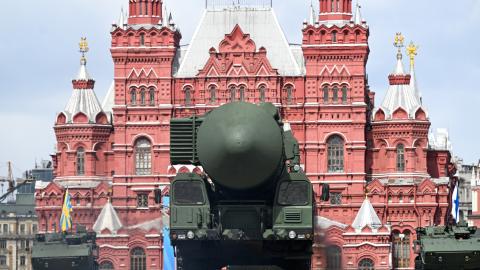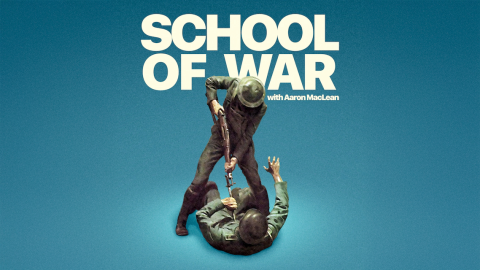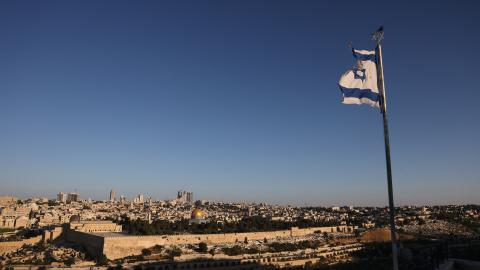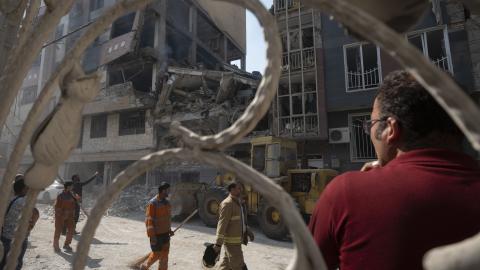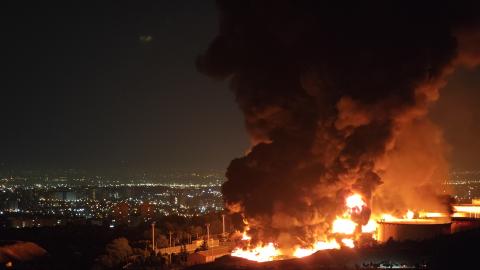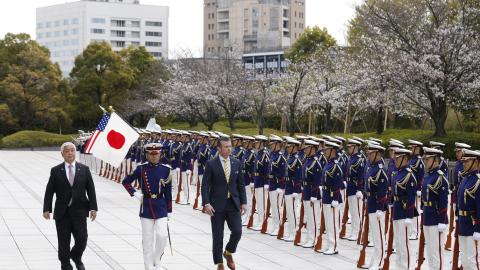The news that Terry Jones, a Gainesville, Fla., pastor with a flock of all of 50 souls, might stage a ceremonial Koran burning during prime time on September 11 roiled the nation and much of the world. The U.S. commanding general in Afghanistan, the secretaries of defense and state, the attorney general, and the president himself each personally and publicly weighed in against Jones. Protests came from Afghanistan, Pakistan, Indonesia, and Malaysia, as well as from Al-Azhar University, the Saudi-based Organization of the Islamic Conference (OIC) and Muslim World League, the Egyptian and Jordanian Muslim Brotherhoods, and the famous Islamic scholar Sheikh Yusuf al-Qaradawi. It also spawned copycat Koran desecrators, who seized on this easy route to the front pages.
Jones’s shenanigans, from which he eventually backed down, would have had little interest — the media give scant coverage to Bible burnings, even those done by the U.S. government (see below), or to Holy Communion wafer desecrations — except for the threat of violence in response.
International incidents triggered by private acts seen as blasphemous to Islam — ranging from theological debate to, in Jones’s case, acts of outright bigotry — have become regular occurrences in Europe and elsewhere. The Jones case was the first American example of its kind, but it surely will not be the last, and it is important to see such events in a global context.
The first thing to be noted is that Muslim attempts to control actions in the West deemed insulting to Islam are comparatively new. As Bernard Lewis has pointed out: “At no time, until very recently, did any Muslim authority ever suggest that Shari’a law should be enforced on non-Muslims in non-Muslim countries.” The first major episode was the Ayatollah Khomeini’s 1989 fatwa against Salman Rushdie’s Satanic Verses, which triggered the assassination of the novel’s Japanese translator, the stabbing of its Italian translator, the shooting of its Norwegian publisher, the burning to death of 35 guests at a Turkish hotel hosting its Turkish publisher, and the lifelong need for security for Rushdie. This fatwa inaugurated a worldwide movement to curb freedoms of religion and speech by exporting blasphemy rules that were already suppressing minorities and dissenters in Muslim-majority countries.
Now violence and intimidation in retaliation against Western “defamation” of Islam are occurring with increasing frequency. The last five years have seen eruptions of violence in reaction to the Theo van Gogh film Submission, the Danish and Swedish cartoons, the pope’s Regensburg speech, Geert Wilders’s film Fitna, and the false Newsweek story on Koran desecration, among many lesser-known examples. This has led to widespread self-censorship in the Western media regarding criticisms of the Koran, depictions of Islam’s prophet Mohammed, and even human-rights abuses such as honor killings.
While the insult felt by Muslims is often very real, much of the outrage is fomented and fanned by governments. For example, the Danish Jyllands-Posten cartoons were published in September 2005 to comparatively little outcry, and some were even republished in Muslim countries. It was only after the December 2005 OIC summit in Saudi Arabia (initially convened to discuss sectarian violence and terrorism) committed members to make an issue of the cartoons that things really erupted. In February 2006, five months after the caricatures appeared, thousands of Muslims across Africa, Asia, and the Mideast set out from Friday prayers for often violent demonstrations, leading to the murder of over 200 people, particularly Christians in Nigeria.
By the time the crisis subsided, an astonishing 99 percent of Jordanians and 98 percent of Egyptians had heard of the Danish cartoons. Given that these countries’ media outlets are tightly controlled, their publics tend to hear only what their governments want them to hear. Saudi Arabia and Egypt, irate about the Bush administration’s Mideast-democratization effort, pushed for boycotts against Denmark and inflamed passions in the street. Iran and Syria were implicated in violence, which was itself at least in part an attempt to deflect attention from Iran’s nuclear project. Turkey later used the cartoons as a bargaining chip to gain strategic, high-ranking NATO appointments for itself.
That it’s not the insult alone, but also its subsequent magnification and manipulation through government propaganda, that causes the rage, should become clear from the following fact: Lars Vilks’s far more offensive 2007 Swedish cartoons and Geert Wilders’s deliberatively provocative 2008 film Fitna led to less outcry from the Muslim world than the Danish cartoons of 2005 had.
What we need to emphasize most is that the responsibility for violence lies with those who order, organize, and commit the violence. A sacrilegious book burning by Jones or his imitators, with enough publicity and direction by Muslim political and religious leaders, could lead to attacks on Americans and on the 100 million–plus Christians who live in Muslim-majority settings. But to compare Jones’s religious extremism, as bad as it is, to bin Laden’s terror and mayhem, as many commentators have done, is a false moral equivalency. The terrorists and vigilantes and mobs, and the leaders who spur them on, often by distorting and exaggerating what has occurred, are the ones responsible for the suffering and death they cause, and it is they who should be called to account.
Finally, no government of a free society can or should protect from private insult religious sensibilities — especially those of Muslim extremists, who usually regard any disagreement with their dogmas and agenda, including by other Muslims, as grounds for violence. The definition of blasphemy is open-ended in the Muslim world, and those targeted by accusations include unorthodox and reform-minded Muslims as well as Christians, Ahmadiyas, and other minorities. Some recent Koran-related incidents in Afghanistan and Pakistan illustrate the point:
— In Kabul in 2008, Ghaus Zalmai and Mushtaq Ahmad were each sentenced to 20 years in prison for publishing a Dari translation of the Koran (the translator was U.S. resident Qudratullah Bakhtiarinejad). The minister for the hajj and religious affairs pronounced the work “a conspiracy by international Zionism,” and Sher Ali Zarifi, chair of an investigating commission on the translation, maintained that “the contents of this book show that its writers and editors are members of a religious pluralism movement in the West.”
— Other Afghans have been threatened by Afghan authorities with execution for blasphemy for liberal views, particularly on women’s rights. Those who try to challenge laws covering blasphemy may themselves be charged with blasphemy.
— Last January, 2,000 rioters protested an alleged Koran desecration by American troops, and six demonstrators were killed when Afghan police opened fire on them.
— In 2007, Afghans angrily protested after soldiers gave local children soccer balls decorated with flags — including Saudi Arabia’s, which carries a Koranic reference. The Afghan parliament demanded a formal apology. (In contrast, in May 2008, after an American church sent Pashto- and Dari-language Bibles to a soldier in Afghanistan, the U.S. military burned the Scriptures, to avoid charges of “proselytizing.” For this incident, there was no apology to anyone, nor any official reprimand from any government.)
— In 2003, after a stone he threw hit a sign bearing Koranic verses, a Christian, Ranjha Masih, was sentenced by Pakistan’s judiciary to life imprisonment for blasphemy.
— On Aug. 1, 2009, after allegations that a Koran had been torn, a 1,000-strong mob, believed to be connected to the Taliban-linked Sipah-e-Sahaba, rampaged through Christian neighborhoods in Punjab. Over 40 homes were razed and at least seven Christians were killed, six of whom (including two children) were burned alive. Pakistani police did not intervene. (There have been a number of incidents similar to this one.)
Such controls would be unconstitutional under the U.S. First Amendment. Moreover, trying to satisfy Afghan and Pakistani expectations through hate-speech laws, as much of the rest of the West is doing, will never work, though it will erode fundamental freedoms.
The Obama administration’s heavy involvement in the Jones case backfired: It fanned a media frenzy that gave Jones the publicity he craved, encouraged copycats, and amplified the event abroad with each high-level official’s intervention. It also reinforced the perception in much of the Muslim world that the U.S. government can and should control religious expression and can therefore be held responsible for its citizens’ speech. Invoking the Jones case by name, the OIC issued a full-throated cry for United Nations bans against “all forms of offense against religions under any circumstances.”
Rather than the government, America’s robust civil society — and especially its religious institutions — should be relied on to speak to, condemn, and ostracize Jones and his ilk, while publicly affirming respect for Muslims. In fact, the great body of U.S. Christian churches did just that.
Our government officials should instead direct their diplomatic efforts toward the governments that manipulate outrage in the Muslim world. It is likely not a coincidence that Riyadh and Cairo have been comparatively quiet while hundreds of young men in Badakhshan, Afghanistan, and Multan, Pakistan, have been burning American flags and effigies — nor that the latter has been happening just when the U.S. is squeezing those governments to end both corruption and back-door support for the Taliban. Riots, linked to Reverend Jones, that left some 20 dead in Kashmir in fact continue a political uprising that began last June.
We should also listen to Muslim leaders fighting against such demagoguery. In response to the Malaysian government’s attempts to criminalize the use of the word “Allah” by non-Muslims on the grounds that it offends Muslims, Marina Mahathir, daughter of Malaysia’s former longtime prime minister Mahathir Mohamad and a social-reform activist in her own right, noted that furor over religious language feeds on itself: At first, only a few are inflamed, “but if you keep stoking . . . , sooner or later more and more people will think, ‘Oh, maybe we should be upset as well.’” Former Malaysian finance minister Tengku Razaleigh agreed: “‘Sensitivities’ is the favored resort of the gutter politician. With it he raises a mob, fans its resentment, and helps it discover a growing list of other sensitivities. This is a road to ruin.”
